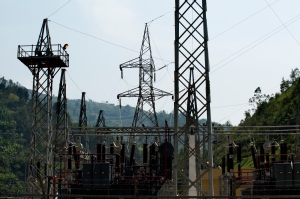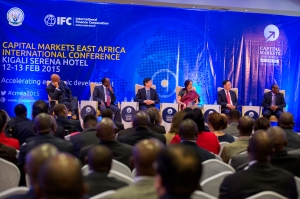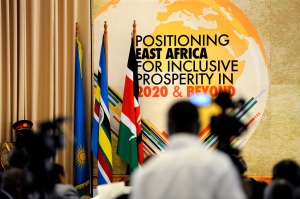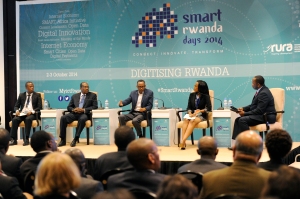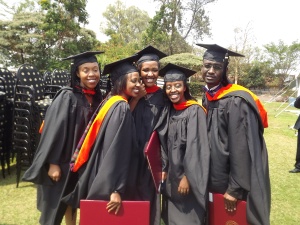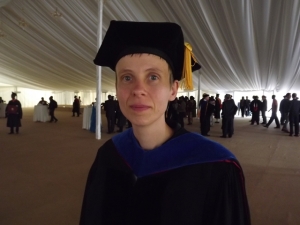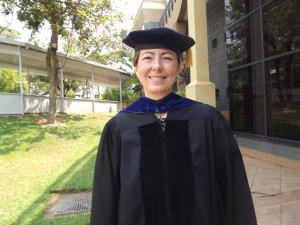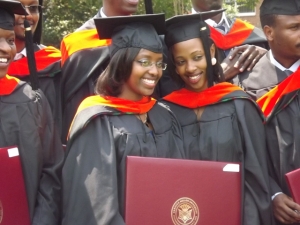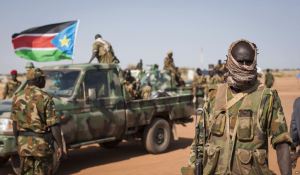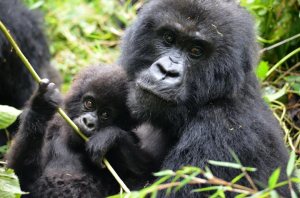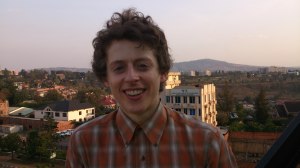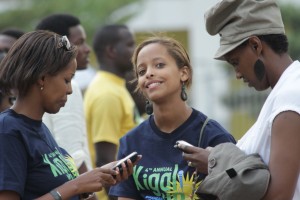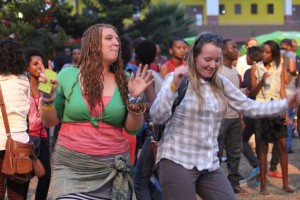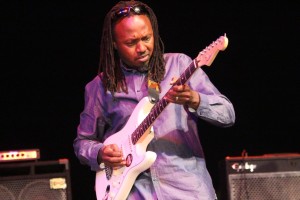Home » Articles posted by Daniel Nzohabonimana
Author Archives: Daniel Nzohabonimana
Ubumuntu Arts festival: An exercise in human introspection
Rwanda introduces an international festival to promote values of humanity
For the first time since the 1994 genocide against Tutsi, Rwanda introduces an international arts festival dubbed “Ubumuntu” which literally translates to humanity. The festival took place on July 11th -12th at Kigali genocide memorial, the final resting place for 259,000 victims of the 100 days pogrom.
Artists from more than 13 countries around the world took part in a two days event of panel’s discussions, workshops and performances that attracted a large audience of locals, expatriates and visitors from all over the world.
The festival`s official song which features a number of local artists gives a message that if you are a human being let`s your heart be filled with humanity. The emotional Ubumuntu song was played throughout the two days festival and encourages people to strive for humanity.
The main theme was “I am because you are”. It explored what it means to be human despite the fact that people comes from different race, nationality, religion among other divisions that have sparked violence throughout the world and cause much pain.
The festival is Hope Azeda`s brain child who is a leading figure in contemporary Rwandan theatre. The founder and artistic director of Mashirika Performing Arts &Media Company told The New Times that the festival is an exercise in human introspection. She went on saying that it is a platform for Rwandans and the world at large to call into question our humanity and bridge the gap between being a human being and being human because the two are totally different.
The audience was thrilled in emotional performances that brought to mind some of the wars and atrocities that happened throughout the world. Emotions were further triggered by the fact that the festival was taking place at Kigali genocide memorial, a symbol of humanity`s failure 21 years ago in Rwanda. The public left for their respective home with thought provoking questions about themselves and the history.
Surprise Nsabiyumva, a 21 year-old student at Kigali Independent University was astonished to find out that Rwanda has talented performing artists. He said that theatre has the power to influence people to avoid acts against humanity and that it will be good if more events like this should be organized to educate the upcoming generation.
The 20 year-old Ms. Fiona Umutoni, a dancer and actress who performed in Mashirika play based on rape said that theater is a platform to show how our society can be if we act as one. “We act to show the difference we want in our society, you are because I am”. She added that people should always consider their neighbors and try as much as possible to make them comfortable.
Philip Luswata the founder and director of Uganda`s Theatre Factory told Kigali Today that the biggest problem we have as human beings and which bring most conflicts is the lack of communication. “Arts allow you to package different messages in a way people can appreciate”. He reiterated that it enables you to say things you would otherwise have not said so it is a powerful tool. Omar Abi Azar is Zoukak`s theatre director based in Beirut, Lebanon noted that theatre is able to question values and what is humanity.
“Cut off my tongue” is one of the performances that impressed the audience. It is a storytelling and dramatized poetry in which artists use movement, dance and music to tell a story about Kenyan identity and aspirations. It was first played in 2008 after Kenya post-election violence at a time of great tension and uncertainty.
The show deals with interrelated stories about life in Kenya grouped around tribe and ethnicity, political critique, identity tradition and genealogy. The show also address cut across post-colonial Africa and the continent struggle to deal with the question of “Nation-State”.
Ubumuntu Arts Festival will from now on be concluding the 100 days of mourning that begin in April 7th each year to remember and honor those who lost their lives in 1994 genocide against Tutsi. It is expected to be an annual platforms whereby art will be playing a leading role to help people express their opinions and share values about all aspects of life that affect humanity.
Can Rwanda meet its energy targets by 2017?
The East African country plans to provide 70% of households with electricity from the current 16% in just two years.
One of the bottlenecks to Rwanda private sector growth is access to affordable and sustainable energy. The economy has been growing by 7.74% on average since 2000 and it is expected to keep that pace as the government plans to transform the country into a middle knowledge based economy by 2020. Today power generation stands at 156 MW and it is planned to grow to over 1000 MW by 2017. Is this target possible to achieve in just two years?
Though the Rwandan government has shown commitment to achieve its development targets, one is tempted to be skeptical about its energy objective. This is because two years is a short period of time to grow power generation by nearly 1000%. In addition to this, it requires high capital investment with risk attached to it. But the government is open to partner with investors and the East African community in delivering this potential.
Recent developments have given a glimpse of hope. In February infrastructure minister James Musoni unveiled a new solar photo voltaic power plant in Rwamagana district that will add 8.5 MW to the national electricity grid. The $23.7 million utility-scale plant was built by Gigawatt Global and will supply electricity to more than 15,000 households. This can sound little given the above target but it is important to note that the third largest plant in Africa was only commissioned last year.
In spite of the huge work ahead one can hope that if all underwent power projects are executed at such a speed, the target can possibly be met. In 2012 Rwanda electricity consumption per capita was 20.26 kWh per person which is one of the lowest in the world. The country generates power through hydro power (59%), thermal generation mainly through hired diesel and heavy oil fuels based generation units (40%) and methane gas (≈ 1%).
However Rwanda has potential sources of energy that waits to be developed to generate electricity to the national grid. The government offers incentives to investors who are willing to partner with it in this endeavor. It provides transmission access to all power projects at its cost, all infrastructures needed to develop projects among other incentives. In partnership with investors, Rwanda aims to generate more than 333 MW, 310 MW, 300 MW, 200 MW and 20 MW respectively from hydro power, geothermal, methane gas, peat and solar PV.
Currently the country has to deal with rising energy demand that mostly originate from industries that struggle to operate their plants. This state of affair reduces the rate of investments in industrial sector. Some investors want to have 25MW on a continuous basis which the country cannot provide to a single industry. Because of the low energy supply, the cost of electricity can go as high as 50% of the cost of production a situation that discourages industrial investments.
In order to increase power generation, Rwanda is set to partner with East African community member states such as Uganda and Kenya. But the country is still facing transmission lines challenges to make interconnection with these countries possible. In December last year Rwanda signed a 5-year contract deal with Kenya to import 30 MW. The country also stands to benefit from a 400 KV electricity transmission line which is one of the major Northern Corridor Integration Projects.
Given Rwanda energy target and ways in which the government plan to achieve it; one cannot completely believe that it will be possible. But as they say:”when there is a will, there`s a way”. Only time will tell us if Rwanda can really provide electricity to 70% of the population in just two years from the current 16%.
Focus on capital markets.
Capital market is a key ingredient for economic growth
Rwanda co- hosted with the International Finance Corporation (IFC) a high-level international conference dubbed ‘Capital Markets East Africa 2015: Accelerating Economic Development in Kigali, Rwanda, from 12-13 February 2015.
The conference brought together300 global and regional experts, regulators, law firms, issuers and rating agency to discuss issues affecting the development of African capital markets, especially in East Africa.
In his warm remark to delegates, President Paul Kagame said that the business sense of the development of capital markets is self evident.
“They mobilize savings for productive investments while the price discovery mechanisms make the economy more efficient, dynamic and transparent”.
Claver Gatete, Rwanda’s Minister of Finance and Economic Planning was quoted by capital market press release as saying that Capital markets have the potential to play a crucial role in consolidating and sustaining economic growth.
“In Rwanda, we are convinced that capital markets provide the best alternative for long-term financing for development initiatives such as infrastructure and energy.”
During the conference Jingdong Hua, the IFC Vice President and treasurer announced the placement of a 3 year maturity, 9% yield 3.5 billion Rwandan franc bonds ($5 million) with offshore international investors.
“I am very happy with the transaction because this paves the way for the Rwandan franc to become an offshore investment currency”. The bonds are the first Rwandan bonds to be placed offshore and will increase foreign investments to Rwanda.
I caught up with global experts to learn how Rwanda Stock Exchange (RSE) can be more vibrant as a young market. In addition to sharing their thoughts and insights, they commended RSE for how much it has already achieved in a short period of time. Though it is the youngest market on the continent, it is equipped with latest technology, globalized laws and regulations.
Experts told me that Rwanda Stock Exchange will only be vibrant if it has the backing of a strong economy. Ted H. Chu, the IFC chief economist said that if you don`t have sufficient enterprises that are growing, the stock market cannot have a healthy growth. He noted that capital market and the economy are conversely related and that a single minded focus on capital market is not enough. “If the capital market cannot provide the necessary funding and means for channeling savings into enterprises then it will have hard time to expand”.
Rwanda comparative advantage
In order to benefit from the stock market, Rwanda needs to answer a key question. What are the critical industries for such a small and landlocked country that need to be developed? Or what is Rwanda comparative advantage in the global economy?
The IFC chief economist pointed out that it is important for Rwanda to identify critical industries that constitute its comparative advantage. Then Rwanda Stock Exchange will play a leading role to raise and channel resources to developing the strategic industries.
Learn the rule of the game
Albert Einstein famously said that you have to learn the rule of the game so that you can play better than anyone else. Rwanda Stock Exchange has therefore an opportunity to learn from other countries early years experience in managing their stock exchanges.
Mr. Chu noted that RSE should allow doing take off initial stages for both investors and businesses to learn from experience.
He argued that in the early stages of capital markets, investors` particularly small investors view the stock market as a get rich quick scheme. As a result the market tends to be far more volatile than the mature stock markets. A young market can therefore be dominated by momentum investors who are chasing quick money.
“I don`t think those kind of investors should be totally discouraging. You need to allow a lot of excitement during initial stages even though it comes at the cost of excessive volatility in the market.”
Opportunity for SMEs
Experts appreciated the fact that the Rwandan market is ready for investment opportunities. Nerina Visser, a South African based consultant in Exchanged Traded Fund said that Rwanda Stock Exchange is a great opportunity for small and medium enterprises (SMEs) to raise capital for expansion.
She noted that SMEs will at the same time be providing investment opportunities for foreign investors who might be interested to trade in shares and participate in wealth creation process that the stock market provides.
However SMEs need to come to the table with well constructed business plans. Salomon Asamoah the Vice President of the African Development Bank made a point at the conference saying that there is no lack of capital to be invested in Africa.
“The problem is having bankable projects”.
Rwanda private sector should therefore be armed with well constructed business plans. Ms. Nerina pointed out that they need to formalize their own thinking about projects they want to implement.
“You`ve got the right proposal to the market then capital is available, simply as that”. The IFC chief economist noted that it is critically important that the government, as the regulator and standard setters put in place market mechanisms to encourage transparency and free flow of information.
“Because SMEs don`t have experience so you cannot set the standards too high at the beginning but on the other hands you need to have minimum standards”.
SMEs need to know the minimum standards to be listed on the stock market so that everybody understands. The government also needs to set full guidance meaning that over time the standards will increase. Mr. Chu said that this is how you can get the stock market to stand up and grow over time.
He warned that if standards are too high you cannot get off the ground.“You need to achieve a steady growth and this cannot be achieved overnight”.
Outreach campaigns
One way to bring momentum to Rwanda Stock Exchange is through communication. The private sector should be sensitized on the new way to raise finance on the stock exchange. IFC chief economist pointed out that education and communication are very important steps that should be undertaken.
Mr. Chu said that we need to nurture local champions and successful stories so that Rwanda`s business community can see role models and be aware of what the stock exchange can enable them to achieve.
“Because right now everything is starting from the ground and every business is small”. How do you deal with this situation? Mr. Chu said that through market participation there can be a dozen small companies quickly turning into midsized then large companies.
“I think nurturing some local champions would be stimulating for the SMEs community. They can see concrete evidence on how to grow a business and being successful taking advantage of Rwanda stock exchange.”
Strategies
Experts argued that even though Rwanda might be the late to come to the party, it is so innovative and proactive in tackling its development issues. This might be one of the reasons why it will be successful to develop its capital market.
Ms. Merina tipped Rwanda Stock Exchange first to look within Rwanda in terms both listing requirements, the capital that might be required in the stock exchange. This is in addition to mobilizing local savings in terms of investment on the stock exchange.
“The more you can focus on the internal resources, the more resilient you are as a stock exchange but also as a market”, said the South African consultant. She further noted that the more dependants you are on international investment flows the more vulnerable you becomes.
RSE should not only focus on equity listing but also look to the bond markets. Ms Merina said that restructuring bond market products will be giving investors a low risky investment and more certainty in terms of the returns that they will achieve.
“In that way you are educating local investors` base in terms of what it means to invest in the stock market”.
RSE in East Africa integration
Rwanda integration process into East African Community was encouraged by experts because it provides economy of scale and competition among market players.
However some experts cautioned what is called institutionalized integration when it comes to capital markets. Ms. Merina said that there is a danger that such integrated market is dominated by one or two big players then the smaller players almost get swallowed up in the process.
“I am very much in favor of integrated infrastructure”. She said that payment settlement system that is already being implemented across East Africa is a good move as it means a sharing of resources.
“But it still allows each of the country to have its national pride for its own stock exchange and really ensure that it remains relevant for its local market.”
She noted that technological and regulatory infrastructure has to be the same across the region.
“I am here talking about technological infrastructure, about free flow of information, settlements and payment systems. This is in addition to allowing alignment of regulatory requirements of accounting standards across East Africa”.
A note on 2014 East Africa Business Summit.
For the first time I had a privilege to participate in East Africa Business Summit that took place in Kigali at Serena Hotel. Head of states from Rwanda President Paul Kagame and from Kenya Uhuru Kenyatta had graced the summit as a way to show its importance to our region business development.
Participants at this strategic think tank deliberated on a number of business and technological issues that are actually dominating headlines. Among key issues that were discussed included regional integration, natural resources exploitation, infrastructure development, skills gaps, Information and Communication Technology among others.
I appreciated the remark by President Uhuru Kenyata when he challenged business community to source goods and services from East Africa before going to China or elsewhere. I think it will be impossible for our industry to develop if our mindset doesn’t change. I guess one of the reasons we don`t create as much jobs as needed is that we always import goods and services instead of buying from local suppliers. Let me note that Chinese mindset is to first check for a local supplier before importing.
A panel on oil, gas and mineral resources drew my attention. Panelists and leaders in private sector discussed about opportunities and challenge East Africa is facing when it comes to their exploitation. It is a fact that our governments will generate a lot of money from these resources exploitation. But it is not yet clear how the money will be invested for the sustainable development of the region.
As I followed deliberations on this topic, I started doubting whether East Africa is really ready to exploit these resources for the benefit of its people. Panelists agreed that oil and gas will contribute a big share in East Africa GDP but no one convinced me that we won`t end up like Delta Niger. The latter is a region in Nigeria where oil exploration polluted that region and created more problems than solutions.
From my understanding it seems like multinationals that won tenders to exploit oil and gas are better prepared for the venture than our governments. Panelists argued that the region lack local skills in oil exploitation, waste management among other skills. In addition to that our government legislation are not up to date in this sector.
Other challenges are that communities where oil will be exploited haven`t yet received compensation for their lands and risk to be marginalized. These are some of issues I personally concluded from discussions in addition to corruption where wrong companies end up getting licenses.
A member of the audience argued that our government seems to be reinventing the wheel in oil and gas exploitation. He said that governments in East Africa should learn from other African countries that are experienced in oil industry. This will help them to learn from mistakes that took place in those countries and use them to their advantage.
Participants in this panel agreed the imperative of adding value to our resources and that this has to be part of the equation. History has taught us that having natural resources isn`t enough for economic development. The summit deliberated on issues of skills gaps that East Africa and the whole of Africa are still facing.
President Paul Kagame pointed out that the most important resources we have are not underground but human resources. As business change with time, a question was raised on how East Africa should ensure that its workforce is relevant to new business realities.
During his presentation on “engaging a 21st century workforce”, Thiru Pillay from Deloitte in Southern Africa said that a seismic shift is happening in this regard. He noted that more than 70% of companies think that their workforce is not capable and believe that workforce development is a serious challenge. It is true governments have done a lot of work to make sure that a big number of its young people go to school but quality is still a problem.
The main challenges that the region face when it comes to workforce development is that our schools are producing graduates whose skills are irrelevant to market realities. The region doesn`t have enough qualified technicians that are needed in key sectors such as natural resources exploitation, ICT among others.
To avoid creating mismatch between what kind of skills businesses need and what our schools produce, Betty Maina from Kenya Manufacturers `Association suggested that private schools should play a leading role in this regards.
East Asian countries termed as Asian tigers did not have natural resources to develop. They designed clear strategies, policies and governance in skill development and it paid off. Thiru Pillay gave an example of Germany where students spend time in schools but also in industries for them to acquaint themselves about workplace realities. It was therefore suggested that industries need to collaborate with schools in order to influence each other on the kind skills needed in the marketplace.
As young people now have access to internet and are capable to use computers, this new reality is set to change how they learn. Betty Maina noted that in the future critical skills companies will need are that of innovators. The chief executive officer of Kenya Manufacturing Association said that companies will need problem solvers. She said that companies need to send a clear signal to schools and universities about the kind of skills they need.
Market realities are constantly changing and the region has now seen the rise of mobile technology. The latter has already started to change the way business is being conducted. A few years ago no one could predict that money can be sent via mobile phone. As more and more people have access to Smartphone, mobile commerce will also become a new reality.
I am glad that East Africa is now a vibrant community although challenges to integrate its economies still persist. During a lunch I happened to be sitting next to a delegate from Tanzania and we discussed about free movement of labor. People from Rwanda, Uganda and Kenya can now freely move and work in these countries without work permit. Tanzania is still reluctant about this move and the removal of other non tariff barriers.
According to the Tanzanian delegate, Tanzania is reserved because of its bad experience that resulted from the collapse of the first East Africa community in 1977. This organization was originally founded by Kenya, Uganda and Tanzania in 1967. Due to misunderstanding between the then member’s states, it failed to achieve its objectives but was later revived on 7 July 2000.
I think that most of the time we learn from our past mistakes. I believe now that lessons were learnt and that as people meet and discuss about their issues, solutions are found and they move forward to a bright future.
How young developers can benefit from Smart Rwanda
From 2-3 October, Kigali city hosted hundreds of business executives from around the world to attend a high –end conference on Information Communications Technology, dubbed `SMART Rwanda days`.
The keynote speakers were President Paul Kagame the co-chair of the ITU-UNESCO Broadband Commission for Digital Development alongside Dr. Hamadoun Toure, the Secretary General of the International Telecommunications Union (ITU).
Under the theme “Digitizing Rwanda”, the conference was aimed to discuss ways in which ICT can significantly contribute to Rwanda as well as Africa social and economic transformation. The conference saw a participation of international organizations such as VISA, World Bank Internet Society, ICAAN, Boston Consulting Group among others.
In Rwanda history, it has never been exciting to be a young person than in today`s digital era. This is an era where everyone with a computer and an internet connection can compete for jobs with the rest of the world. A young person with ICT related skills can actually become his own boss. This would have been a dream a few decades back.
Speaking at the conference, President Paul Kagame said that digital innovation is one of the things that can significantly transform the livelihoods of Rwanda as well as Africans. He noted that it does that by being applicable to any and every sectors of economic growth. The head of state said that Rwandans as well as Africans have to deal with the problem of mindset and believe in themselves.
This is a fortunate situation for young developers in Rwanda to have a government that has understood the power of ICT in economic transformation. The government has a clear vision, policy and strategies when it comes to ICT. It is also building their capacity by investing in schools that offer ICT skills that are required to compete in digital age. In addition to that the government is attracting international conferences that expose them to current trend in ICT.
The environment in which the current generation is working definitely prepares them to innovate and create successful businesses. The government has invested in infrastructure by laying a 4500 km fiber optic throughout the country worth over a $ 130m. A number of tech incubators and hubs have also been created and they provide unprecedented opportunities for young innovators to transform their dreams into reality.
Klab is one of those incubators where young people have a free access to office space as well as internet connection. Gone are those days when a fresh graduate was spending his time applying for jobs. Now any young person with a laptop armed with ICT skills can instead spend his time developing his idea into a product or service that the market needs.
Now that Rwanda plan to become an information-rich and knowledge based economy, young developers have opportunities to create applications that are needed in the marketplace. The government of Rwanda is set to invest a lot of resources in Smart Rwanda and this is a golden opportunity for young developers to earn money. It is up to them to take the chance and develop solutions that the government needs to reach its objectives.
Smart Rwanda is government program that will help the country achieve its ICT and 2020 vision. The government is ready to spend a lot of resources on this program that started in 2013 and will run up to 2018. It has defined ten sectors where ICT can have a maximum impact in economic transformation. These sectors are in education, healthcare, governance, business, agriculture, environment, job creation, infrastructure, women empowerment and cities.
During a recent live TV show that took place at Klab, Rwanda`s minister of Youth and ICT Jean Philbert Nsengimana said that the government aims to see every citizen being smart. He noted that from a farmer, a teacher, a business person, etc. the government would like to see each and everyone adopting ICT and becoming smart.
The minister chose to come to Klab knowing that he will be interacting with the right audience meaning developers who will create applications for Rwandans as well as Africans to become smart. Young innovators in Rwanda have therefore a good working environment and are now informed about which sector they can develop applications for Rwanda to be smart.
Over the recent years, we have seen Africans inventing applications that are now used all over the world. Take for example M-Pesa, a mobile-phone based money transfer application that was invented in Kenya and launched back in 2007. It has since expanded to Afghanistan, South Africa, and India among other parts of the world.
M-pesa come to provide solutions for local problems in Kenya. The application was intended to people who don’t have a bank account and who needed to transfer small amount of money. Developers in Kenya who invented this application saw an opportunity to serve people whom the banking system was not serving.
If Kenyan developers have done it, the question is why can`t Rwandans developers also do it. It is not rocket science and as president Paul Kagame noted, one need to have confidence that they have what it takes to succeed. Young developers have therefore the opportunity to create applications that can solve local problems and which can also provide global solutions.
Luckily brain power is equally distributed as noted by Dr. Hamadoun Toure during SMART Rwanda day’s conference. Young developers can therefore make use of it and create wealth for them and contribute to social and economic development of their country.
CMU Rwanda Sees Women Embrace ICT Field
What does it take to inspire women in developing countries to achieve their educational dreams? A group of women in higher education moved to Rwanda for the purpose of educating the next wave of Rwandan leaders in information and communications technology (ICT).
The American-based, top-ranked college of engineering, Carnegie Mellon University–Rwanda campus, held its first ever graduation ceremony since it started its operations in Rwanda back in 2012. The ceremony was held on July 24. Among the 22 graduates were five outstanding women.
Roads lead to Rwanda
Back in 2008, when Dr. Hedda Schmidke was sitting in a car on a highway in Hamburg, Germany, she heard a radio report about Rwandan women entrepreneurs. The reporter talked about how they were building their own companies and developing their countries after the 1994 genocide against the Tutsi.
“I was really amazed by the courage of those women and as a German I know what it means to rebuild a country after a devastating war,” said the PhD holder in computer science from the University of Hamburg, Germany. She immediately considered how she could join them and bring her help. Her second idea was to find a position as an ICT professor in Rwanda, but she had no idea how it would materialize. Little did she know that her next destination would be in the Land of a Thousand Hills.
After some weeks, she found out that Carnegie Mellon University was going to build a campus in Rwanda and that it was looking for ICT professors. She was awed by the coincidence of the two circumstances and decided to send her job application. Fortunately she got a job as an associate director at Carnegie Mellon University–Rwanda campus. She has been teaching ICT-related skills to the group of 22 graduate students since 2012.
Like Schmidke, Cathy Bishop also unexpectedly moved to Rwanda from the US when one of her friends got a job at the campus and jokingly suggested that she should join her. Bishop decided to come over as a visitor for three months just to look for career prospects. Within a month she was hired.
Bishop, who is also an instructor and software engineer, has been helping the students with technical support and computer science works. She was jubilant with her students’ educational achievement.
A ground-breaking graduation
Among the guests of honor at the graduation ceremony, which took place at the Serena Hotel in Kigali, was Dr. Jelena Kova˘cevi´c. She is the head of the electrical and computer engineering department at Carnegie Mellon University PA. Kova˘cevi´c remarked, “I came over to attend this ceremony and was impressed by how hard our female students worked to complete the two-year program leading to a master degree in computer science.”
She said that out of 22 student graduates, 25% are women, and that it is a great achievement in itself. She noted that the program is creating a new wave of technological leaders, some of whom will be women: “These are smart women who are capable to make a difference in Rwanda social and economic development.”
Susan Brown, a scholar-in-residence at the University of Colorado was excited to see these women graduating despite the many challenges they went through. “Even in the U.S. we have such kind of proportion of women graduating in engineering schools.”
She pointed out that in Rwanda, women are more interested in ICT, and it is easy for them to get scholarships. She noted that the policy of the government to promote women plays to their advantages.
However despite all the promotion of women in ICT, Brown said that girls should be encouraged to join programs like these and that it will help raise their quotas in science and technology fields. “If they don’t apply there is no way the government can support them to reach their potential.”
Dr. Kova˘cevi´c noted that there are some clichés and pre-conceptions that perhaps engineering is a man’s field, but “there is nothing preventing women from doing this kind of work. I am saying this from my personal experience because I am so passionate about it. This is one of the most wonderful jobs you can have in the world.”
About the graduates
Among Schmidke’s students are five smart and hardworking women who have just graduated with master’s degrees in information technology. “Our students are really amazing,” she said. “Women that just graduated are very successful entrepreneurs who are running ICT companies.”
One of the students, Marie Claire Murekatete, just graduated with a master’s degree in computer science. She recently got married and had been combining her career as a senior software engineer at Rwanda Development Board with her studies, in addition to family
responsibilities.
Murekatete said that young girls are reluctant to join science and technology fields as they perceive them as difficult subjects that are meant for men. Back in high school, she attended mathematics section. In her class there were only three girls out of 42 students.
Luckily she had always been at the top of her class since the time she was in primary school. Her father was the main driving force that encouraged her to always excel in her education; he rewarded her with gifts. Unfortunately her father and other members of her extended family were massacred during the 1994 genocide against the Tusti. She remained with her mother, who could not adequately provide for the family.
“The encouragement I used to get from my dad was no longer there,” noted Murekatete. Fortunately, she was still motivated to work hard and remain at the top of her class. “I kept going like that up to the time I graduated from the university and was on top of my class.”
Now that she has graduated, she is set for a successful career. She was recently selected for the 2014 Tech Women Emerging Leader award by the U.S. Department of State’s Bureau of Education and Cultural Affairs (ECA). In September she is flying to the United States to join peers from Africa and Middle East in a strong network of women who are committed to advancing their career and pursuing their dreams while paving the way for those who follow.
Esther Kunda, a graduate of the master’s degree program in computer science, was fortunate
to belong to a family that understood how education could provide her with an advantage, so they pushed her to pursue all the opportunities she could. She said, “My father was the one who encouraged me to register at CMU – Rwanda and pursue this program.”
She said that traditionally, women in Rwanda have always considered science and engineering fields as fields that are hard and reserved for men. Kunda noted that women have been a majority in informal sector because they were not given enough of a chance to continue their education.
Now Rwandan women are slowly joining the formal sector and are embracing science and technology studies that are at the forefront of empowering them to be part of Rwanda’s social and economic development.
Esther’s mother had been her role model, as a career woman who successfully raised herself and her four siblings: “My mother has always been working at the post office in management position since I was a child and am going to emulate her.” She said that women should work hard to turn their dreams into realities.
It is Schmidke’s hope that the skills students have gained throughout the two-year program will shape the future of their careers and the companies they will be working for.
South Sudan conflict might be fueled by foreign interests
Over the last month, our TV sets displayed African heads of states posing for photos with the Obama’s on the sideline of US – Africa summit in Washington. Those head of states we did not saw were either busy dealing with Ebola outbreak in their home countries or were simply not invited. President Robert Mugabe falls in the latter category. He chose to visit China as he is trying to generate support for Zimbabwe`s crumbling economy according to the Telegraph.
Though he accepted Obama`s invitation, President Salva Kiir Mayardit of South Sudan is in fact not happy with the role of the United States in South Sudan conflicts according to an article published this month in the New African magazine. The article titled “South – Sudan: why peace remains elusive” by Baffour Ankomah and was published on 19 August 2014. It details behind the scene machinations of South Sudan conflicts that is mainly fueled by foreign interests in the youngest country`s natural resources.
The conflicts that erupted on 15 December 2013 between president Salva Kiir and his vice president Dr Rieck Machar led many to believe that it was just another “African war”. Apparently it is not the case: the conflict is in part fueled by the economic interests of the United States and China. Baffour Ankomah reveals that from the vantage position of the government in Juba, one sees the hands of powerful outside forces hiding behind the scenes and stoking the fires, thereby making it not a local issue at all.
While the mainstream was expecting a new beginning after South Sudan independence on 9 July 2011, this was not the case for US oil companies and their Chinese counterparts. In the aftermath of South Sudan independence, US oil giants found themselves out of the country`s vast oil resources industry. Despite billions of dollars that were spent by the US government for South Sudan to reach its independence, US oil companies were set to gain nothing from the country`s oil resources. They are in large part under Chinese and other Asian oil giants.
This situation was merely created by the US government according to the article. It all started in the 1980`s by Washington not liking the SPLM/A because of America`s geopolitical and strategic interests of that time. The latter pushed it to support a United Sudan with the capital in Khartoum. America feared the so-called “communist threat” posed by Ethiopia under Mengistu Haile Mariam and its dislike for Muammar Al Gathafi`s Libya.
America support to Khartoum slackened in early and mid-1990s with the conclusion of the Cold War and Bashir government bending towards Islamist extremism. The late French President Charles de Gaulle was quoted as saying that states don`t have friends but interests. This is actually what happened when America switched its support from Khartoum to SPLM/A as it started to benefit from Washington`s political, economic and military support.
If Chinese companies found themselves having a large stake in South Sudan oil resources, it is surprisingly Chevron the American oil giant that was the first to prospect its oil resources. Chevron was surprised to discover that fish actually die of old age in the Suud region of South Sudan according to Baffour Ankomah report. Today, however there is not one US oil company in South Sudan`s oil industry. This situation is fueling the South Sudan conflict according to the same report.
South Sudan president, Salva Kiir Mayardit argued that this is a result of Washington mistake and that Juba does`t have any responsibility in it. As the South battled to break away from the North before 2005, the US had problems with the government in Khartoum and decided to pull out its oil companies from United Sudan that was under al-Bashir government. As the large chunk of oil resources happened to be in the South, the American pulls out affected the future of South Sudan.
This is what explain the absence of US oil giants in today`s South Sudan oil industry. The latter is actually dominated by America “new economic enemy” from the East headed by China and to a lesser extent India and Malaysia via their oil giant, Petronas. “You can imagine how this state of affairs rumbles stomachs and minds in the corridors of power in Washington”, writes the New African reporter.
In January this year during the African Union Summit held in Addis Ababa, Ethiopia many delegates voiced their concerns over how Americans are stoking fires in South Sudan for their selfish ends. The US definitely would like to have a share of the huge revenues Chinese and Asian companies are making out of South Sudan oil industry. At which price? Only the people of South Sudan can answer to this question.
AU delegates accused the Americans to be behind the political conflict that led to the breaking out of war in Juba on 15 December 2013. President Salva Kiir confirmed the allegations in an exclusive interview in Juba and accused his former vice president, Dr Rieck Machar of conspiracy with Americans to overthrow him. Dr Machar might have assured Americans that if they help him become president, he would drive out the Chinese and other Asian oil companies from South Sudan and handle everything over to the Americans.
This is an unfortunate reality for South Sudanese people who are mostly young. They should now be enjoying “the freedom” their ancestors fought for. I wonder how the new economic war between the US, Europe against China and other Asian countries in Africa would leave us the youth of this great continent. Recently the US invited African head of states to the 2014 US – Africa Leaders summit and before that China, Japan, India did the same.
All this can be summed by the well-known aphorism of an American politician: “It`s the Economy stupid!”. Why can`t our leaders be united behind a common purpose and shield this continent from incessant conflicts?
Rwanda`s gorillas role in communities development
A decade ago when Rwanda tourism authorities decided to launch “Kwita izina” (Gorillas naming ceremony), people jokingly said that gorillas had become more important than human beings. In the Rwandan culture this ceremony normally happens in a family after the birth of a newborn.
When this ceremony was launched back in 2004, the public was skeptical about the decision to value baby gorillas the way human beings babies are in the rwandan society. After decades of civil wars that had plagued gorilla’s natural habitat and exposed them to poachers, it was necessary to protect them from imminent extinction.
Communities around Volcanoes National`s Park consisting of 125 km2 of mountain forest where the world famous mountain gorillas live were against the government`s move to stop their poaching activities. Villagers were used to enter the forests of the volcanoes for hunting purposes or to collect wild honey thus interrupting the natural ecosystem that sustains the gorilla populations.
The sudden change could not wholeheartedly be welcomed. Ten years later the same communities have come to understand the sustainable value of protecting mountains gorillas. Not only they promote the image of the country at the international level thus growing tourism revenues but also communities are now directly benefiting from tourism revenues.
The government in 2005 launched the Shared Tourism Revenue Scheme whereby 5% of annual tourism park revenues would be channelled into community development projects. Since then a total of 360 initiatives have been funded by the scheme country-wide, including roads, water facilities, health centres, cooperatives and more according to a press release by Rwanda Development Board (RDB) in June, 2014.
During the 10th anniversary of Kwita Izina (the annual gorilla naming ceremony) this year, a primary school was launched in Nyabihu District in north-western parts of Rwanda by RDB. The school consists of six classrooms and will be attended by over 380 students and was built with funding from the Shared Tourism Revenue Scheme that comes from 5% of annual tourism park revenues.
While speaking at its launch, RDB’s Head of Tourism and Conservation Ambassador Yamina Karitanyi said: “Conservation is not just about maintaining the parks, natural features and wildlife; it is also about empowering communities. Through this school, we hope to transform the lives of children in the area by enabling easy access to education facilities.”
Each initiative among the 360 that were funded since 2005 had a positive impact on community development. The livelihoods of communities around the park areas have been improving year by year as the country`s tourism revenues increase. In 2013, Rwanda hosted 1,137,000 visitors who generated $294m, up from $62m in 2000. Mountains gorillas have also registered a 26.3% growth since 2003 thanks to Kwita Izina that played a key role in this success.
The same people who used to threaten the parks and its biodiversity have come to conclude that gorillas constitute a key asset to their communities. They are now ones of strongest advocates for its conservation.
A Harvard student`s experience in Kigali, Rwanda.
Over the course of eight weeks, I came across a 20 year old computer science student from Harvard University. Stephen Turban is such a brilliant and hard working young man who would impress anyone who observes the way he works.
During the time he has been in Rwanda, the American young man spent most of his time at kLab which is an open space for IT entrepreneurs to collaborate and innovate. He got funding from his school and came over for a social media health internship.
He had been working with a couple of students from the college of medicine and health at the University of Rwanda to create a template for making radio more interactive. His team was made up of two college students from Harvard and a couple of partner’s students from the University of Rwanda.
“We have been creating a health radio program that focuses on social media in a way that impact health”, said Stephen. How do you use social media in a way that impact health? “Ultimately the question comes back to how you use Face book, twitter, etc to make people take better healthcare decisions.
When he first come to Rwanda he started learning about media landscape and realized that the only way to communicate with people is through radio. About 90% of the population regularly listens to the radio. “So we realized that we have to use radio if we want to be relevant and in order to do something that can impact the community”, noted the Harvard Student.
He told me that the best way to make behavior change is to make a program that is interactive. “In that sense we were creating a radio program that is interactive through social media. The radio program is based at Radio Salus which is one of popular radio stations in Rwanda.
The health related program run every Thursday and Stephen`s team wanted to make it more interactive so that it can create a real behavior change in the community.
IT community at kLab
Stephen had no idea about Kigali and was expecting to find himself in a small city in east Africa. To his surprise he found a vibrant city that offered him a place where he had been interacting with young Rwandan IT entrepreneurs at kLab.
“As I am preparing myself to go back home, I will always remember the incredible people from kLab. I have been thinking a lot about my time in Rwanda and Klab always come in mind because that where I spent most of my time working on my project.
“This is a community of people who are always ready to help each other. They have such tenacity to build something new”.
Missouri and Kigali city
Stephen internship time gave him a chance to see the difference between Rwanda and his home region. I have been here for eight weeks and am about to head back home to the great city of Missouri in the mid west of the USA.
He said that Missouri is so different with the lands of thousand hills. “Rwanda in general is a land of hills but Missouri can be apply named the land of thousands fields of corns”.
“Missouri is pretty flat but not as other mid western states. There are lots agriculture fields and has many parts that are rural but also other that are urban. His home place has two large cities : St Louis and Kansas City. Stephen grew up in Missouri where his family have been staying since his childhood.
Family background
For the time I have been observing Stephen busy working and collaborating with young Rwandan IT entrepreneurs, I remarked that he is a hard working young man. I decided to find out his family background to know its impact on his behavior.
“My parents grew up focusing on learning and my dad favorite phrase is “developing as a person”. His mother was pushing him and his sister to work hard in school but she never told them what she expected from them.
“My parents made me see that learning is something cool to pursue and this is something we got from them.
Stephen`s dad, Daniel Turban is a professor of management studies at the University of Missouri. His mother is a real estate investor and owns a couple of rental properties.
He told me that his father is interested in issues such as happiness and productivity. “When I come home in the night from visiting my friends, I always find my dad reading magazines such as The Time, The Economist or National Geographic”.
“My mum on the other side is interested in subject such as plumbing, painting so they have different passions”. Stephen has one sibling which is his sister who just graduated from the University of Saint Louis in aviation management and has a pilot license.
His dreams
Stephen has got two huge dreams. In short term he want to become fully fluent in Chinese. “I want to be able to read and say anything in Chinese and that takes a lot of practice.”
“I love learning and there is so much fun in doing so”. He spent five years learning Spanish and speaks it pretty well.
Learning Spanish was easy for him as it is similar to English. “When you are learning it as someone who has an English background, you don`t really push yourself hard on how you think.” He said that you figure out easy formula and how to apply them well.
Stephen wanted to learn a language that challenges him to think in different way. “I am lucky because my parents grew up in Hawaii which has an Asia predominant culture”.
He thinks that in every place you find two main cultures. “In the South of the USA, we have the first US culture and the second culture is Mexican.”
The same apply in Hawaii where there is the first American culture then the Asia culture. “My parents come from there and when I was growing up I felt comfortable around Asia culture such as Asia food and people from there”. So that is why I became interested in learning Chinese.
Stephen said that he is lucky during this vacation as he was able to discover Rwanda and will also go to China after his reach home.”I will be back in Missouri for six days hanging out with my family and friends enjoying the beauty of Missouri”.
“Afterwards I am going to be in China for ten days. I am so excited by having been invited at the Youth Olympic in Nanjing which is in the Southern parts of China”. Though it is for a short stay, it will be an opportunity for him to develop Chinese language.
Stephen also dream to start a company with his friends within the next two years. “The company is about self improvement and that could be about a lot of things. It can be about productivity or learning . I really love becoming better at something.”
Rwanda is becoming a growing destination for internship students from the US and Stephen is one of them that I had an opportunity to personally know.
It was a pleasure knowing him and I wish him well in his future endeavors. I jokingly told him that he should not forget about me when he become the next Mark Zuckerberg as he has what it takes to be successful in his future career.
2014 Kigali Up: “Time to celebrate Rwandan art, music and culture” – Mighty Popo
IN its fourth edition, Kigali Up music festival brought world class live music performances to the city dwellers. All ways were leading to Amahoro National stadium in the weekend of 19th to 20th. More than ten thousand people turned up to the annual music festival as renowned artists from all corners of the world entertained the excited public.
The festival was not only a time to enjoy music and dances performances but also an opportunity for visitors and tourists to discover what Kigali city has to offer in terms of art and music. Food and drinks were served all along the festival as visitors and tourists tasted to local as well as international meals. Rwandan arts were also on sale in different exhibition stands that were displayed inside the stadium.
The festival attracted renowned artists from the United States such as Joey Blake and Rhonda Benin, Didier AWADI from Senegal and Rwandan artistes from the Diaspora such as Ben Kayiranga among others local and regional artists. Rhonda Benin in collaboration with a group of young Rwandan artists thrilled the crowd with “Because I`m happy” performance.
Rhonda thanked the organizers of the festival for inviting her to perform on her continent of origin. Rhonda is an African American artist whose roots hail in Africa. She reminded the audience that her people suffered and perished during slavery and should also be remembered every time Rwandan pay respect to those who lost their lives during the 1994 genocide against Tutsi. .
Didier AWADI is going home after having made a lasting impression in the spirit of many in the audience according to Social media comments. He organized a workshop with local hip pop artists and their performances would remain one of the key highlights in this year edition. Kigali Up is therefore playing an inspiring role to local artists by exposing them to international artists through workshops.
The director of Kigali Up music festival, Charles Murigande also known as Mighty Popo expressed his satisfaction on the overall success of the event. He said that organizing such kind of festival is a challenge in itself but that he is ready to take on. “This festival is growing from the grassroots and we will be growing up and up”, noted the Rwandan Canadian artist.
Mighty Popo stressed the importance of Kigali Up music festival in boosting the image of Rwanda as a growing tourist’s destination. The latter is the 15th festival accepted in Africa under the Africa Music festival network and Rwanda has been accepted into this network because of Kigali Up. The music festival is establishing itself as one of the events that tourists will be attending as they visit the land of thousands hills.
Murigande plays guitar and is an artist, musician, composer, and actor. He has performed in various Canadian folk festivals where he lived for 27 years. Now he is back in Rwanda and is managing the first public music school ever in Rwanda. He is one of many Rwandan in the Diaspora that regularly chooses to come back home and be part of a new RWANDA.

